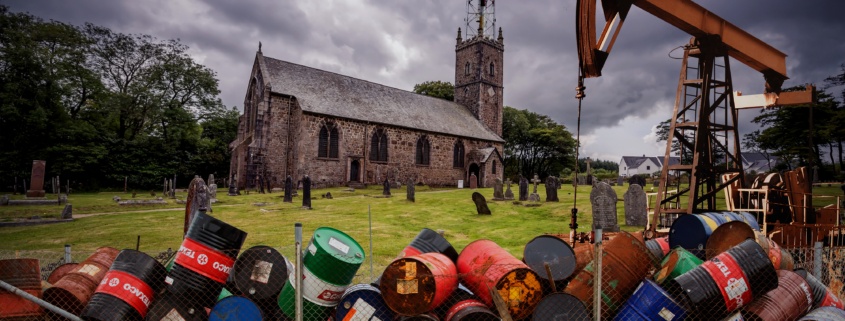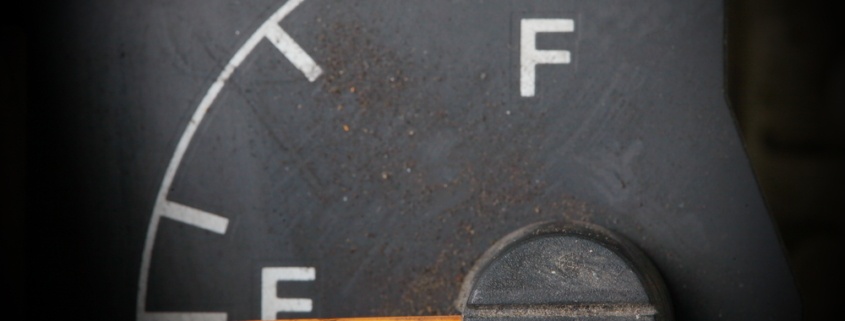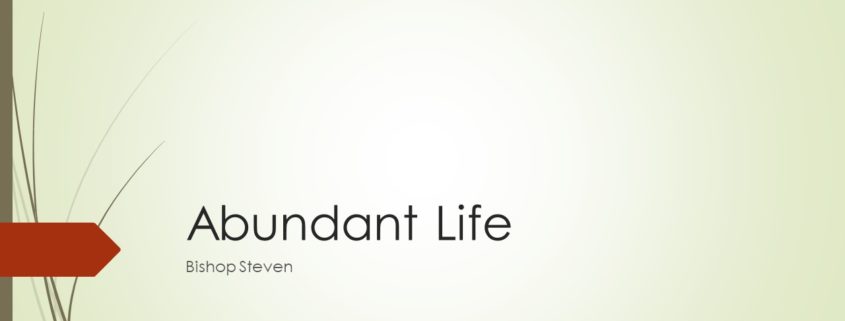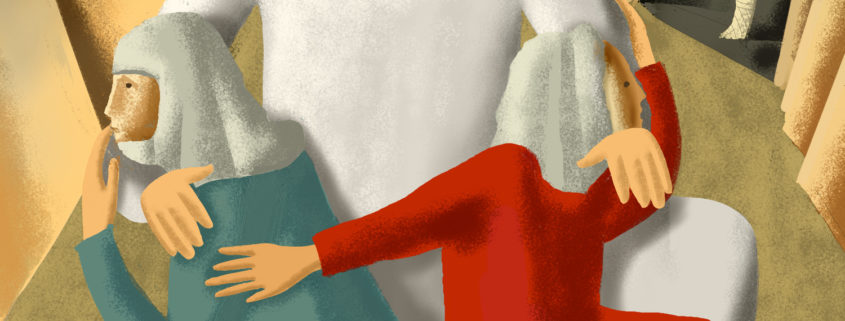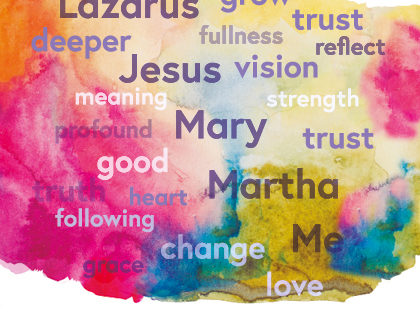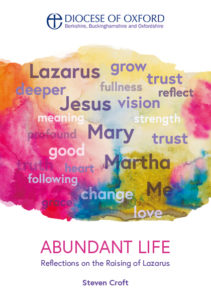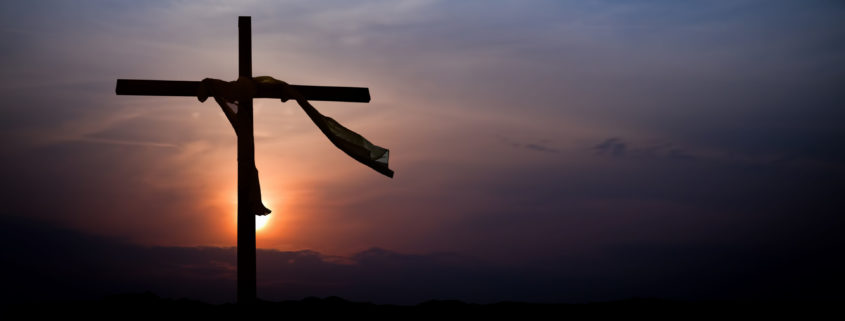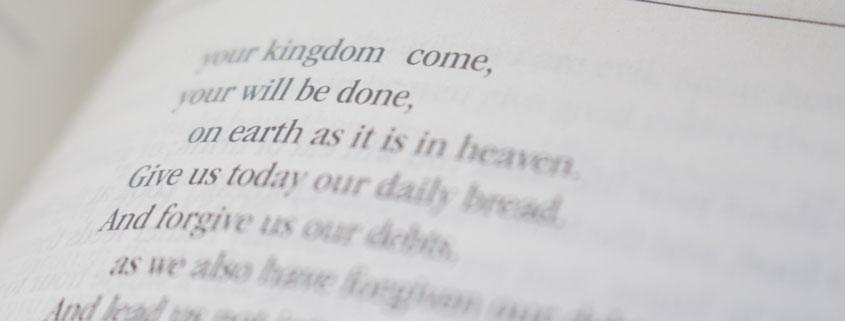Join the Bishop of Oxford as he prays for the renewal of the ministry of every parish church in teaching the faith to enquirers and new Christians.
Address from the Common Vision Area Day at Green Park Conference Centre in Reading, 3 March 2018
Lent begins this year on Ash Wednesday, 14th February, and lasts for 40 days until Easter.
Lent began in the early church as 40 days of preparation time for new Christians to prepare for baptism at Easter. Read more
A couple of weeks ago I had my first experience of “Plough Wednesday”: an annual opportunity to explore rural life and ministry across the Diocese of Oxford with about 40 others. “Bring wellies and warm clothing” were the instructions.
First stop was the Mapledurham Estate, just north of Reading: an inspiring address from the team whose goal has been for a generation to create and keep jobs on the land and in the local economy. Land which cannot be used for farming has been developed in other ways as a golf course, a centre for paintballing and other outdoor pursuits. The impact has been significant.
We drove via the dairy herd up the hill to encounter the anaerobic digester (my first such meeting). Slurry from the cattle goes in, along with maize grown on the estate. Electricity comes out along with dried residue which is ploughed back into the ground as fertiliser. Back down the hill then to the working water mill using the energy of the Thames to generate clean electricity. An essential part of the shift to renewable energy the world over is the move from a few large power plants to many different smaller sources. I was struck by the number of obstacles the estate has had to overcome in innovation – particularly from the planners and those who want the countryside to remain unchanged.
We travelled from a large estate to a smaller farm. The farmer was the fourth generation of his family to work the land here. He described the key shift he has led from dairy to arable and beef production. The economy is continually changing with more unpredictable change on the way because of Brexit. He and his colleagues are passionate about the core purpose of farming: to produce food. He is eloquent on the fragility of the farming economy and the care with which risks are balanced and decisions are taken. We see some of the ways his farm has diversified through solar energy, letting sheds and offering storage solutions.
Even a hardy Yorkshireman was feeling cold by this stage. Lunch was at Bix Manor – very good local soup and Oxfordshire cheeses, paving the way for the afternoon session. Then onto the Nettlebed estates. We heard a little bit about bovine tuberculosis and cattle at Shiplake but at Nettlebed there was a chance to hear more about the devastating effects of a positive TB indication on a dairy herd. Again, we were moved at the resilience needed by the farming community as well as the isolation and loneliness experienced by many farmers. One of the excellent agencies involved in the day is the Farming Community Network which offers much needed pastoral and practical support.
The other story at Nettlebed was of pioneering cheesemaking. The estate has begun a new dairy to make local cheeses to great acclaim already. There are two varieties so far: Bix and St Bartholomew (named for the local church). A third is in development. I learned that there is as much care needed in making a good local cheese as a good local wine. The business is making headway but again needed to overcome significant hurdles. The farm has installed a scrap wood burning heating system which also heats St. Bartholomew’s Church: another example of energy conservation and good ecology going hand in hand with good business.
A short service of Evening Prayer in the Church drew the day to a close. I gained new insights into the work of farmers and those involved in the rural community in this part of Oxfordshire and Berkshire. I came away with the deeper appreciation for our Rural Officer, Glyn Evans and our rural ministry team. I was given a fresh understanding of the courage, skill, wisdom and determination needed to farm and to manage estates in an uncertain climate. I give thanks to God for the ingenuity, care for creation and determination we witnessed and all those we met.
An update on our common vision process
Over a hundred people from across the diocese came together on Saturday 20th January to reflect on progress so far in our common vision process. We gathered as lay chairs, area deans, members of Bishop’s Council and others who had shared in our Common Vision conference in May.
We began our day on Saturday with prayer and worship and dwelling in the Word, looking once again at the Beatitudes and going deeper. We heard “mid-term” reports from the groups looking at the six areas of focus and had the opportunity to test out their thinking in detail. And I launched two new publications from the diocese, published in time for Lent…
What kind of Church are we called to be?
We are exploring together a call to be a more Christ-like Church: contemplative, compassionate and courageous. In September I invited every church, chaplaincy and school in the diocese to explore these themes in many different ways.
We are using two bible passages to resource our thinking. The first is the beatitudes in Matthew 5. Almost 4,000 copies of our short course, Exploring the Beatitudes, have gone out. Many churches have used it already. There has been lots of encouraging feedback about the 3C’s in particular.
My email of the week last week was from the PCC of Upton-cum-Chalvey in Slough. They have decided to add a final point to the agenda of each meeting:
“Have we been courageous, contemplative and compassionate in our discussions and decisions tonight?”
Many churches have set time aside in Lent to look at the Beatitudes material. I was in St. Andrew’s Sonning yesterday, baking bread at an all age Eucharist and talking about Jesus’ picture of yeast and the kingdom: we need to work these passages of Scripture through the whole life of the diocese and that takes time
Abundant Life: Lazarus
This week we are publishing two new resources to help churches and schools to explore what it means to be contemplative, compassionate and courageous and to live an abundant life.
These two resources explore a different Bible passage: the wonderful story of the raising of Lazarus in John 11 and 12.
Yvonne Morris has written a book for children and families co-published with GodVenture. It’s a 32 page full colour family activity sticker book with over 200 stickers.
I have written a series of 21 reflections on the story of Lazarus in the style of Reflections for Daily Prayer.
I wanted to offer something this time for the many people across the diocese who are not part of small groups but want to engage with exploring what it means to be more contemplative, more compassionate and more courageous. Hence Abundant Life is suitable for individual and small group study. With this in mind, three outline group discussion sessions will be published online towards the end of the month.
Both books are available to order now and there is a discount for the next couple of weeks. Click one of the pictures below to find out more – for those reading this outside the Diocese of Oxford both resources are relevant in any Church of any denomination as you explore abundant life.
What are we called to do together?
Many deaneries and parishes have their own Mission Action Plans and many are already thinking through what the call to be contemplative, compassionate and courageous mean for their own planning.
There are some things we are called to do together as a diocese as we work with what God is already doing across Oxfordshire, Berkshire, Buckinghamshire and Milton Keynes.
In September we established six working groups to explore the six areas of focus which had emerged from all the listening in the previous year.
On Saturday we had the opportunity to hear the “mid-term” reports from each of the six groups and test out their thinking in detail. My own summary of what the six groups have said so far is below, together with a link to the audio recorded on Saturday for each of the six groups.
I also gave notice that we need to establish a seventh group to look at re-envisioning church-based work with children and young people across the diocese.
- Making a bigger difference in the world and serving the poor
This group is looking carefully at three common areas of concern: at access to housing across the diocese; at tackling climate change and at putting fresh energy into community engagement. - Sharing our faith with adults, children and young people and growing the local church in every place (rural, urban and suburban)
This group is exploring contact, conversation and dynamic catechesis as three key ways forward in intentional evangelism and sharing our faith. There is more on catechesis in my December blog post. - Planting new churches and congregations everywhere we can
A population the size of Edinburgh is due to arrive in the diocese by 2030 (almost half a million people). Engagement with existing churches is falling in some areas. We need a vigorous new strategy for planting new churches and to become a more mixed economy church. This group is proposing a clear goal by 2025 to see 750 new congregations of 15 or more; 50 new churches with over a 100 members and 4 new churches with over 250 members. They also want to see a more permission giving culture and more than 18,000 people in new worshipping communities. - Serving every school in our community
This group has done a lot of listening to the need to support engagement with every school in the diocese and is beginning now to develop good ways of doing this for the future. - Putting the discipleship of all at the heart of our common life and setting God’s people free.
This group recognises that it is working on deep cultural issues in our common life and that there are no easy answers. They are exploring how faith is re-ignited, how confidence to live out our faith is increased and how people can be equipped and energised to live as disciples. - Celebrating and blessing our largest, fastest growing city, Milton Keynes
A new prayer initiative has begun in Milton Keynes. There has been a lot of deep listening. There is a desire to appreciate all that is good but also to think boldly and creatively about ways forward. This group wants to emphasise that it is “not about the money”. They will not be seeking a disproportionate allocation of diocesan resources to Milton Keynes. They have identified six critical ways forward for mission in the city.
You can find more detail of the six groups and who is involved on the Common Vision page of our website.
Responses
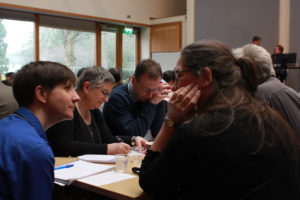 The gathering spent most of the time on Saturday reflecting in detail on the group’s plans and then reflecting on the deeper cultural issues we face.
The gathering spent most of the time on Saturday reflecting in detail on the group’s plans and then reflecting on the deeper cultural issues we face.
There was broad support for the direction of travel which was good to see.
There were also some hard and good questions asked both on detail and the broader picture and process.
I flagged up early in the meeting that we will need to pay attention to how we implement the plans and strategies which emerge from this process.
Drawing it all together
As we move ahead into the second half of the year, I hope the whole diocese will continue to reflect on what it will mean to be a more Christ-like Church: contemplative, compassionate and courageous and the ways in which these work through into the life of every parish and school and chaplaincy and our common life.
The working groups will continue to develop clear, courageous goals grounded in careful listening to God and to the wider church and community. We will be seeking to draw those goals together into a common vision and strategy for the diocese in July for adoption by the Diocesan Synod in the autumn.
Please continue to pray and engage with the process. Details of the ways you can do that are set out below.
+Steven Oxford
Events and communications
We held a Common Vision Development day for the Dorchester Area in the autumn. This term we have three major events, these days are for anyone who would like to come. Click each link to find out more and to book a space.
- A consultation for young people across the diocese on Saturday 24th February
We have invited up to 10 representatives from each of our 29 deaneries. - A Development Day for the Berkshire Area on Saturday 3rd March
- A Development Day for the Buckingham Area on Saturday 24th March
You can also sign up for our regular eNews, which includes regular updates about the Common Vision process.
Over thirty years ago, I became Vicar of Ovenden in Halifax. For all of that thirty years, I have been exploring the ancient-future discipline of helping to form adult Christians in the faith. The Christian tradition has a name for this discipline: catechesis.
It has long been my conviction that the renewal and reform most needed in the life of the Church of England and the Church in the United Kingdom is the renewal of catechesis: laying the good foundations of faith in the lives of enquirers and new Christians.
Today sees the publication of a new catechism, The Pilgrim Way, as part of the Pilgrim course. This short article gives the deeper biblical and historical background to catechesis and to the new catechism.
The New Testament
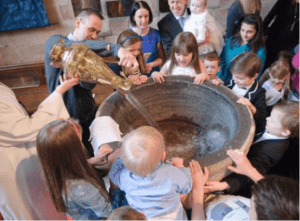 The term catechesis is used from the New Testament onwards as a term for Christian formation and preparation for baptism and lifelong discipleship. The term is used for the period of formation beginning from first enquiry through to and beyond baptism and being established in the faith.
The term catechesis is used from the New Testament onwards as a term for Christian formation and preparation for baptism and lifelong discipleship. The term is used for the period of formation beginning from first enquiry through to and beyond baptism and being established in the faith.
The gospels were written as tools for catechesis. Luke is explicitly written to Theophilus “so that you may know the truth concerning the things about which you have been catechized”.
John’s gospel begins with the journey of enquirers to Jesus and ends with an appeal to faith. The very heart of catechesis is introducing people to Jesus.
Catechesis is concerned with the whole of Christian formation not simply the learning of facts or doctrine.
One way of reading the story of the Emmaus road is as a paradigm story of catechesis: Jesus walks with those who are going in the wrong direction away from Jerusalem. The four means Jesus deploys in Christian formation are the building of community through listening; attending to the scriptures; prayer and the sacraments; and engaging in witness and mission. These are four means the Church has used in every age to grow disciples. Together they form the ways in which we discern the risen Christ.
There are four great metaphors for this process in Scripture. The first is the journey seen in Exodus and Exile; in the story of the two sons; in the Emmaus and Damascus Road and the earliest description of the Christian faith as the Way.
The other three metaphors are all found in 1 Corinthians 3: Christian formation is a labour of love, like parenting, giving a special diet to those not yet mature; it is a work of partnership with God and with others, like farming, sowing, watering and waiting; it is a work of development, like building, first laying a foundation and then teaching the new disciples how to build well in their own lives.
The word catechesis has at its centre the term “echo”. Good Christian formation is founded on repetition of certain texts and phrases which become embedded in the heart and a means of transformation (Carol Harrison, Listening in the Early Church, Oxford, 2013). The aim of Christian formation is to create a resounding inner echo of God’s living Word, an image of Christ at the centre of each disciple’s life through learning very simple core texts by heart.
The Early Church
Catechesis in the early centuries of the church was the work of several years of formation and instruction. To be baptised into a Christian minority was a serious decision.
Catechesis was important and continuous. It shaped much of the ordinary life of the Church, including its worship. The early Church deployed an annual cycle of formation leading up to baptism at Easter. Those who were catechumens and receiving instruction would enrol for baptism in January or February often in response to preaching on particular Sundays.
They would then receive further instruction during the forty days before Easter: the origin of Lent. The rest of the Church would keep Lent with them as a reminder of their own baptism (see William Harmless, Augustine and the Catechemenate, Pueblo, 1995)
Formation would include community, listening to the scriptures, prayer leading to the sacrament of baptism and the eucharist at Easter and sharing in God’s mission.
The core texts for instruction were the Apostles Creed and the Lord’s Prayer although a wide variety of scriptures were used. There is some evidence that the commandments and the beatitudes were also used in this way.
This pattern of formation was normally led by the bishop and was given priority in his ministry. He was assisted in this by the presbyters and deacons.
The pattern of formation was remarkably effective and led to the sustained growth of the Church, by the grace of God, as a minority community across the Roman empire.
Augustine has left us a small but powerful essay on catechesis: On instructing beginners in the faith. Augustine stresses above all the importance of joy in Christian formation:
“Our greatest concern is much more about how to make it possible for those who offer instruction in the faith to do so with joy. For the more they succeed in this, the more appealing they will be”
The Monastic Movements and the Mediaeval Church
From the conversion of Constantine onwards, the Church grew rapidly and became the majority religion of the Empire. Baptism as an infant became the norm, decreasing the focus on adult catechesis as the means of entering the Church.
Much of the wisdom on Christian formation was nurtured and developed by the monastic movements. The monastery was the place to be supported in living a countercultural Christian life in a rhythm of prayer, rest and work. Benedict seeks to establish in his rule “a school for the Lord’s service in which there is nothing sharp and nothing heavy” – an excellent guide in Christian formation.

The deep Christian formation found in the monastery then inspires the work of preaching, teaching and catechesis in parish churches. Europe was evangelised by religious communities establishing deep places of formation and prayer from which women and men were sent to love and teach the faith.
This pattern is evident in the evangelisation of Britain from Ireland from the north and by Augustine of Canterbury from the south. It is evident in the sending of missionaries from Britain into Scandinavia and Germany and in the revival of the great monasteries of France which led eventually to the founding of the great universities.
England from 1287-1530
In 1281 the Archbishop of Canterbury and the English bishops agreed a Lambeth declaration. The clergy were to expound the Christian faith no less than four times each year. The content of the faith they were to expound was as follows:
- The Apostles’ Creed
- The Lord’s Prayer
- The Commandments
- The 7 works of mercy (based on Matthew 25)
- The 7 vices
- The 7 virtues
- The 7 sacraments
These elements formed the basis for the teaching of Christian faith in a largely non-literate and non-book culture before the Reformation (see Eamonn Duffy, The Stripping of the Altars, Yale, 1992, Chapter 1, How Piers the Plowman learned his Paternoster).
 England from 1530-1740
England from 1530-1740
The English Reformers faced a new challenge: the teaching of the recast and reshaped Anglican faith and identity to a population learning to read in the midst of a technological and political revolution.
The key was the development of a simple catechism issued with the Book of Common Prayer in 1548 and revised in 1604 and again in 1662.
The catechism is based on Martin Luther’s shorter catechism. It is in a simple question and answer format making it easy to learn and remember. It is based around:
- The Apostles’ Creed
- The Lord’s Prayer
- The Ten Commandments
The familiar sentences about the sacraments were added at the 1604 revision.
The catechism was printed as a primer to help people learn to read. People would learn their letters first and then the be introduced to their first text: the catechism. This primer became the bestselling book of the 16th Century in Britain (by far).
The same texts were used in Morning and Evening Prayer and the service of Holy Communion. They were often written on large boards at the front of Churches.
All clergy were expected to give instruction in the catechism every Sunday by law. The pattern after ordination was first to pay attention to writing and giving your catechetical sermons which were continually revised and renewed.
This investment in catechesis was pursued with great energy. Between 1530 and 1740 there is evidence of over 1,000 different printed catechisms in English. All or part of over 600 still survive (see Ian Green, The Christians ABC, Catechisms and Catechizing in England, 1530-1740).
This focus on catechetical work also results in the Westminster Shorter Catechism of 1646 and the powerful series of addresses on catechesis by Richard Baxter, Vicar of Kidderminster, The Reformed Pastor, published in 1657 and hugely influential.
Catechisms become in this period a way of more closely defining doctrine as this became contested rather than simply means of teaching and communicating faith. For this reason they became longer and, paradoxically, less useful for teaching enquirers.
From 1740 to the present day
John and Charles Wesley and the Methodist movement make a very substantial contribution to the English tradition of catechesis through the creation of special provision for adults who are seeking to learn the faith through bands and classes. They return to the principles of the early Church in setting catechesis at the heart of the life of the local church with remarkable effect.
There is some evidence that these were imitated in home meetings in Anglican churches through the eighteenth and nineteenth centuries, which also saw the rise of the Sunday School movement and an immense investment in the teaching of the faith to children and young people.
Through the twentieth century, the disciplined practice of catechesis was in decline and neglected for much of the century. There are many reasons for the decline of the Church of England in the twentieth century but one of the most significant is the neglect of the regular, systematic teaching of the Christian faith to enquirers and new Christians.
The Roman Catholic Church invested significantly in catechesis in the period following the Second Vatican Council, publishing the Rite for the Christian Initiation of Adults in 1974 and the Catechism in 1994.
In the late 1980’s and through the 1990’s the discipline saw something of a revival of catechesis in the Church of England through the development of nurture groups and process evangelism courses (Alpha, Emmaus and Christianity Explored). This revival of catechesis remains the principal factor behind the growth in some parts of the Church of England over the last 30 years.
This rediscovery of catechesis was practice led: parishes discovered through trial and error what was effective in nurturing new Christians and then spread that good practice. This was supported by research (particularly by John Finney and Robert Warren). Theological connections began to be made with the catechetical practice of the early Church and with the Roman Catholic renewal of catechesis.
The Church of England sought to draw its parishes back to the principles of catechesis in the 1995 report, On the Way and to draw together liturgical practice and Christian formation. On The Way argues for a return to the four texts of the creed, the Lord’s Prayer, the Commandments and the Beatitudes. The report was not widely taken up but remains a key text for the study of the discipline. On the Way had significant influence on the development of the Common Worship initiation services.
In 2012, the House of Bishops of the Church of England commissioned further work on catechesis in what became the Pilgrim course. The four Pilgrim authors (Robert Atwell, Stephen Cottrell, Paula Gooder and myself) sought to work within this long tradition of catechesis in developing the Pilgrim materials in focussing on the four texts and also returning to the Emmaus road disciplines of listening to create community, attending to scripture, prayer and the sacraments and engaging in mission. Many other bishops and teachers contributed to the development of Pilgrim.
Pilgrim has been widely used across the Church since publication. Over 150,000 books and other resources have been sold.
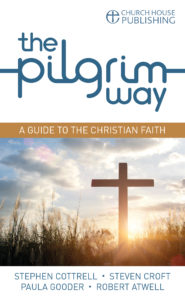 The Pilgrim Way – a new catechism
The Pilgrim Way – a new catechism
The Pilgrim authors printed the (largely forgotten) Revised Catechism of the Church of England as part of the Pilgrim Leader’s Guide, partly to show we were working in this ancient and modern tradition of catechesis (http://www.pilgrimcourse.org).
A couple of years ago we began work on a new catechism for Pilgrim, to support new Christians in their journey of faith. The Pilgrim Way was published as part of the faith section of the new Church of England website a couple of weeks ago. It is published this week as a short booklet, The Pilgrim Way, a guide to the Christian faith. We have consciously worked in the great tradition of Christian formation to develop a simple, accessible tool for a deeply spiritual and vital task of ministry.
A further renewal and revival of catechesis is needed in the contemporary Church of England, working within this great tradition but taking advantage of new digital technology to proclaim the gospel afresh in this generation.
+Steven Oxford
Order The Pilgrim Way from Church House Publishing
Most of us learn the Lord’s Prayer as children. But then we forget what it means. Over the last few weeks I have found myself teaching the Lord’s Prayer to several different congregations – over 2000 people in all, including many young people.
We live in a world and a country with poor mental health. Yesterday the government announced £300 million new funding for children with mental health measures. It’s welcome but already people are saying it won’t be enough.
There is increasing evidence that our consumer culture actually undermines mental health, especially in the young, and creates a deeply demoralised society prone to depression and other mental health conditions[1].
Jesus gives his disciples a prayer not to teach them to be pious but to help people everywhere to live well and flourish.
Here are seven reasons why the Lord’s Prayer is good for mental health – seven reasons to say the Lord’s Prayer, as Jesus intends, every day.
- To remember who you are
Our Father in heaven, hallowed by your name
To say the first line of the Lord’s Prayer is to answer the deep question of identity at the heart of our culture. We no longer know who we are.
The first line of the Lord’s Prayer reminds us that we are not random specks of matter floating through an infinite universe: we are created and called into relationship with our creator who loves us as a parent loves their child. We are called into relationship with our fellow men and women as sisters and brothers. You are loved and your life has meaning.
- To find courage to live well in an imperfect world
Your kingdom come, your will be done on earth as in heaven
The world is not yet as it was intended to be. God is at work within it, bringing justice and peace. That work was begun in Jesus Christ but is not yet complete.
We are aware of the suffering in the world like no other generation before us because of 24-hour news and instant reporting from anywhere in the world. We need a framework to understand that immense suffering and the evil in the world in order to know how to live.
- To find the only way to be content
Give us this day our daily bread
All year we are bombarded by advertising: every time we look at a screen or listen to the radio or open a magazine. The single aim of advertising is to steal our joy and create discontent and longing for more stuff or different experiences.
Jesus teaches his followers to pray each day not for more but for just enough. This is the open secret of what it means to be content and find joy in this life: to realise and appreciate what we have. This line alone is the antidote to the misery created by consumer culture (especially at this time of year).
- To learn to live with our imperfections
Forgive us our sins….
Sins are the ways in which we fall short of the ideal. All of us do that. But our culture creates expectations of perfection. We think we are supposed to look good, perform well, make a great impression in every moment of our lives.
Jesus gives us a prayer to say every day which simply acknowledges that we fall short – we are not perfect people. Each day we can come to God and ask forgiveness and seek help and strength for the day.
- To learn to live with the imperfections of others
….as we forgive those who sin against us
The Lord’s Prayer reminds me that other people are imperfect as well. I need a way to deal with my own rubbish and with theirs. Otherwise all my relationships will be spoiled and clogged up and I will increasingly be alone (which is actually what happens to people who are unable to forgive). Somewhere near the root of many mental health conditions is isolation.
Jesus offers us this prayer to say each day in which I let go of and forgive the things others have done to me: the small slights, the neglect, the careless words, and begin again.
- To be resilient in a challenging world
Lead us not into temptation but deliver us from evil
Consumer culture eats away at our resilience by persuading us that life should really be comfortable and easy all the time. That is one of the deepest lies ever told.
Human life is difficult. Over the course of your life you will face many challenges: illness, adversity, relationships which go wrong, failure and, in the end, mortality.
To live well is to have an understanding that life is challenging and hard, because of the imperfections in the world, in yourself and in others. But strength and help are available in God in all circumstances.
To pray the Lord’s Prayer each day is to prepare yourself for whatever difficulties lie ahead.
- To understand the end of the story
For yours is the kingdom, the power and the glory, for ever and ever, Amen.
This part of the prayer was added by the Church. It’s not there in the two places in the Bible where Jesus teaches the Lord’s Prayer (in Matthew 6 and Luke 11). It takes us back to the beginning. It reminds us that a life lived well is a life lived with purpose to the glory of God.
It reminds us that in the end, God holds the end of the story. God will bring all things to completion. God will watch over us through this life and welcome us, beyond death, into the life to come. That God is over all and in everything and all manner of things shall be well.
Most of us learn the Lord’s Prayer as children but never fully understand what it means. It’s impossible to exhaust all the meaning in the prayer.
But say it, if you can, every day of your life to remember your identity, to find courage, to learn contentment, to live with your imperfections and those of other people, to build resilience and to understand the end of the story.
+Steven Oxford
[1] See John F Schumaker, The Demoralised Mind, New Internationalist, April, 2016 https://newint.org/columns/essays/2016/04/01/psycho-spiritual-crisis
All six regular readers of this blog will know that I attempt at least one new hymn every year as the verse for my Christmas card.
I’m under no illusions that they will endure. I love words and enjoy crafting them in different ways. The satisfaction is as much in the writing as in the singing.
The text I have spent the most time with this year is Matthew 5.1-10: the beatitudes from the Sermon on the Mount. I’ve recently asked every community in the Diocese of Oxford to spend some time dwelling in this text and exploring what it means as we seek to be a more contemplative, more compassionate and more courageous church.
A hymn is one way of dwelling in the text. Each half verse takes one beatitude as its theme. It’s not a translation of the words but a reflection on them and especially on the idea that the beatitudes offer us a self-portrait of Christ.
I’m not a musician so always write to a particular and well known tune. The tune this year is Blaenwern, best known as the setting for Charles Wesley’s magnificent hymn, Love Divine. Hum it to yourself as you read the words.
You’re welcome to reproduce the hymn and use it if it’s helpful. Let me know how it goes.
Our new three session course for small groups on the beatitudes can be ordered here.
Gracious Lord, our hands are empty
Beggars seeking life and grace
Graft our lives into your own life
Gift your Spirit in this place
Hearts of stone we lift for blessing
Hearts of flesh we seek anew
Help our eyes see with compassion
Comforter, our joy renew
Servant Lord, you came in meekness
Stooping low to show our worth
Banish pride, restore love’s sweetness
Help us heal your wounded earth
Give us hunger for your kingdom
Thirst to see your ways prevail
Satisfy our hope for justice
Make us lights which will not fail
Living Lord, your name is mercy,
Love made flesh in life and word
Kindness shown to the unworthy
Grace which can be touched and heard
Pure in heart, you offer wholeness
Open eyes that cannot see
Win for all complete forgiveness
Come to set your people free
Son of God we seek your healing
Over this fragmented globe
Mend our lives, our homes, our nations
Making peace, one seamless robe
Help your church to be courageous
Joined in your eternal search
For the lost, the least, the helpless
Make us more a Christ like Church


